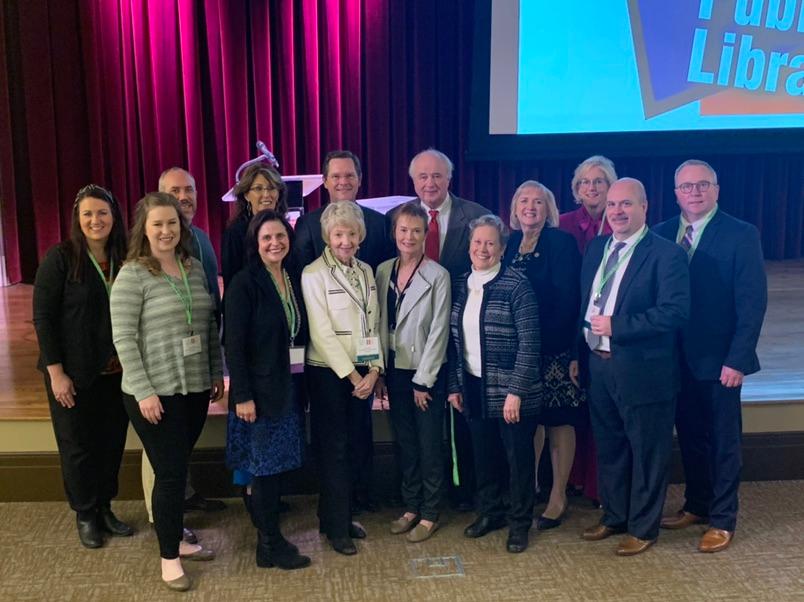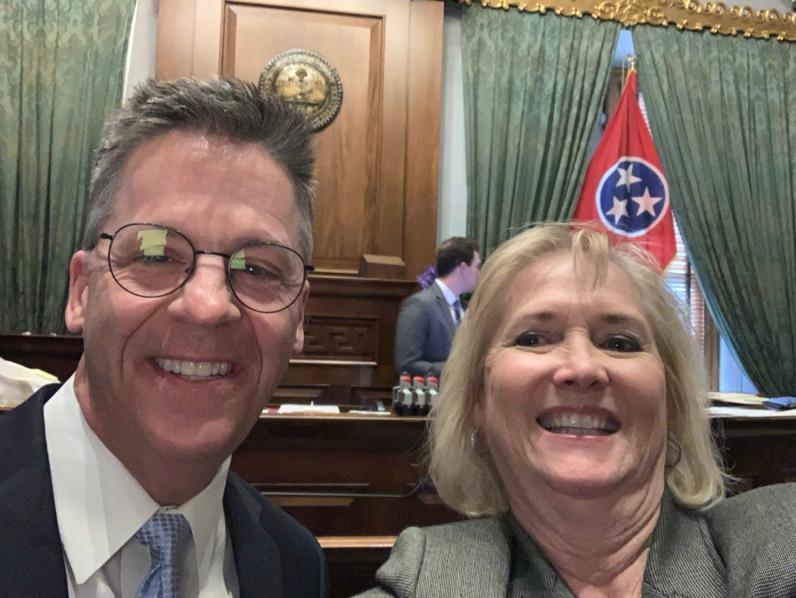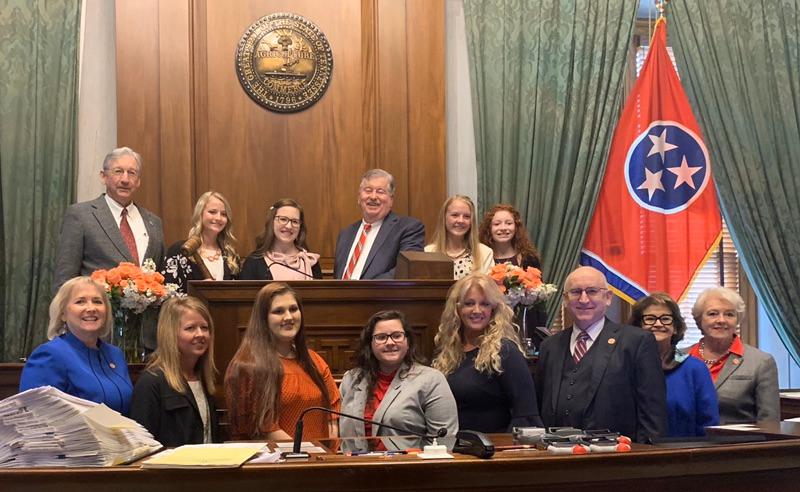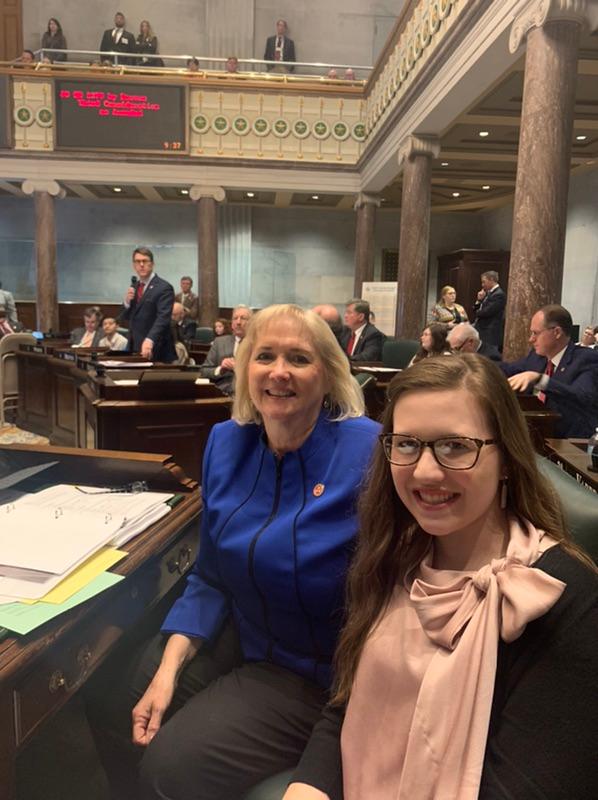
I will be hosting a telephone townhall with Dr. Martha Buchanan, Knox County Health Department on Tuesday, March 24th at 5:30. You will be able to ask questions on the COVID-19 crisis. I will send out call in information on Monday. I hope you can join in.

General Assembly passes conservative budget continuing government services and aiding in the battle against the COVID-19 pandemic
The Tennessee General Assembly recessed the 2020 legislative session late Thursday evening after passing a conservative budget which continues state government services and aids in the battle against the COVID-19 pandemic in Tennessee. State legislators also acted on several bills considered critical to the function and operation of the state, or which contained mandatory responsibilities and calendar-sensitive obligations to mitigate the effects of the crisis.
The budget recognizes essentially no new growth in Tennessee revenues for the upcoming fiscal year set to begin in July as a result of the crisis, whereas previously it was anticipated at the rate of 3.1 percent. As a result, the legislation removes approximately $900 million in improvements from Governor Bill Lee’s original proposal in order to meet the challenges ahead.
The amended budget comfortably covers the essentials while making appropriate reductions and investing in reserve funds. It responds to the tornado disaster and the COVID-19 crisis by adding significantly to the Disaster Relief Fund and providing $150 million to establish a new fund to cover public health and safety issues related to the COVID-19 pandemic. In addition, it strengthens the state’s safety net for health and mental health programs for uninsured Tennesseans. This includes an additional $9.3 million in non-recurring funds and $3 million in recurring funds for the adult health care safety net.
The legislation doubles the Local Government Grants proposed by Governor Lee earlier this year from $100 million to $200 million for infrastructure and to help mitigate the economic effects of the crisis on local governments. It also includes an additional $350 million in the Rainy Day Fund to ensure Tennessee remains prepared and continues to fully fund obligations such as the Basic Education Program (BEP), children in state custody, inflation growth in TennCare and other liabilities.
The budget ensures the state will be in a posture to respond to the epidemic, while providing the essential services to Tennesseans. Tennessee’s commitment to fiscal responsibility places the state in a stronger financial position than the vast majority of other states to address the challenges ahead. Tennessee has a Rainy Day Fund, which is the state’s savings account for emergencies or economic downturns, that is unprecedented in state history. This uniquely positions the state to face many of the economic challenges presented by the pandemic.

Sen. Ken Yager and I enjoyed visiting with members of the Knoxville Homebuilders Association during their day on the hill
Legislation ensures students, teachers, and schools will not be penalized due to current state of emergency
Legislation passed the General Assembly this week ensuring that students, teachers, principals and school districts are not adversely affected by closures or other school-related hardships due to COVID-19 and the March 3rd tornadoes. Senate Bill 2672 waives certain K-12 education rules and requirements to help those impacted by Tennessee’s current state of emergency. It also requires the State Board of Education to revise high school graduation requirements to ensure that no high school seniors affected by the school closures fail to receive a high school diploma for which the student was on-track and otherwise eligible to receive.
The bill reiterates the recommendation by Governor Bill Lee that all Tennessee schools should remain closed through March 31st. Due to school closures, it waives the requirement for TNReady and end of course assessments that were scheduled this spring for the 2019-2020 school year, unless school districts administer them voluntarily. If such voluntary tests are administered, scores for students, teachers and school districts will only be used if it reflects positive growth or a higher grade.
The legislation also waives:
· the requirement for 180 days of classroom instruction;
· BEP-related requirements to ensure that school districts and employees shall continue to receive full state funding despite any lengthy school closures; and
· the11th grade postsecondary readiness assessment for the 2019-20 school year.
The State Board of Education is charged with promulgating any necessary emergency rules, guidelines and resources in order to implement the waivers.
In addition, the bill authorizes the Tennessee Student Assistance Corporation to create emergency rules to protect financial aid and credit opportunities, including dual enrollment courses, for high school students.
The bill now heads to Governor Lee for his signature.

As Chair of the Arts Caucus, I welcomed arts advocates and their board for their Day on the Hill

Rep. Justin Lafferty I enjoyed visiting with representatives from Knoxville Habitat for Humanity
Deadlines for higher education financial aid programs waived due to COVID-19 delays
Legislation was approved before the General Assembly recessed to ensure students affected by Tennessee’s state of emergency are not denied access to higher education financial aid programs and scholarships due to specific calendar deadlines required by state law. Senate Bill 1973 authorizes the executive director for the Tennessee Student Assistance Corporation (TSAC) to temporarily suspend, modify, or waive deadlines or other non-academic eligibility requirements in law, rule or policy for any of Tennessee’s financial aid programs when an emergency declaration is issued by the governor.
Some of the state’s financial aid programs rely heavily on fixed dates in the calendar for students to meet certain deadlines. For example, graduating seniors in high school who are seeking to use the Tennessee Promise scholarship are required to attend certain meetings, submit proof of community service, and meet with their mentors by certain fixed dates. If a student does not do so, they cease to be eligible for the scholarship permanently.
Currently, there is no latitude either in the statutes or in rule to provide the Tennessee Student Assistance Corporation the ability to waive or suspend those fixed deadlines despite the school closures and meeting cancellations and changing circumstances for high school attendance across the state. This legislation protects the tens of thousands of eligible high school graduates by providing the Executive Director of TSAC with the necessary but temporary authority to make those deadline decisions as they arise.
The legislation is set to be repealed on June 30, 2021.
In other news…
Governor Lee signs executive order to bolster response to COVID-19 – On Thursday, Governor Lee signed Executive Order 15 to relieve regulatory burdens and free up the Executive Branch to more effectively respond to COVID-19 in Tennessee. The purpose of the order is to boost Tennessee’s health care capacity, continue important consumer protections and provide enhanced customer service to our citizens during this pandemic.
To boost health care capacity, the executive order further deregulates hospital beds. Some hospital beds in the system are not available for use in their current capacity for COVID-19. There are currently 15,000 licensed, unused beds within Tennessee’s hospital capacity. The order also deregulates scope of practice, allowing more health care professionals to treat patients. It also expands the number of providers who are eligible to work in Tennessee through the use of technology and telehealth. In addition, it loosens HIPPA regulations so COVID-19 patients can utilize alternative technologies such FaceTime to communicate with a health care provider.
It expands the number of providers who are eligible to provide telehealth services by loosening regulations around technology and geographic area and urges insurers to provide coverage for COVID-19.
In order to provide customer service to those seeking to renew their driver’s license, the Department of Safety is waiving its requirement that citizens appear in person and have a new photograph taken through October 1, 2021. This will allow many customers with expiring credentials to renew online and not visit in person. In addition, all driver licenses, learner permits, commercial driver licenses, photo identification licenses, and handgun carry permits that would expire between March 12, 2020, and May 19, 2020, will be extended for six months from the original expiration date. Gov. Lee has asked the federal government to delay the October 1st deadline to acquire a Real ID. That decision from the federal government is pending.
To protect consumers, the executive order cracks down on the price gouging of consumer foods and supplies. Governor Lee said, “We are working hard in state government 24-7 to address the great challenges the lie before us.”
Governor Lee requests disaster loan assistance from federal government for Tennessee’s small businesses — Governor Bill Lee requested Economic Injury Disaster Loan assistance this week from the U.S. Business Administration to help small businesses across Tennessee suffering losses as a result of the COVID-19 pandemic which was approved by the federal government on Friday. This action will allow Tennessee’s small businesses and nonprofit organizations suffering economic injury as a result of the virus to be eligible to apply for disaster assistance of up to $2 million per applicant. The loans can be used to pay fixed debts, payroll, accounts payable or other bills that can’t be paid due to the disaster’s impact. Interest rates for the loans are 2.75 percent for nonprofit organization and 3.75 percent for small businesses.
Small businesses are the backbone of Tennessee’s economy with more than 94 percent of the state’s private sector businesses with 50 or fewer employees. Small businesses can find more information about these efforts by visiting www.SBA.gov and you can apply here. Additional information can be found here.
The Department of Labor and Workforce Development has set up a COVID19 Response and Resources guide to help employers and employees affected by the pandemic. The website can be found on their website at https://www.tn.gov/workforce/covid-19.html
General Assembly votes to extend assessments critical to operations of hospitals, nursing homes and ambulance services – The Senate approved three bills this week critical to the operations of Tennessee’s hospitals, nursing homes and ambulance services by extending assessments used to draw down federal matching funds. Senate Bill 2202, the Tennessee Hospital Assessment Act, raises $600 million in state funds, which allows Tennessee to receive $1.1 billion in federal matching funds, for a total of $1.7 billion for the state’s TennCare program.
The assessment, which has been in effect since 2010, provides hospitals a portion of their unreimbursed TennCare costs. In addition to the reduction in payments to hospitals and health professionals, a few examples of programs that would be affected without the assessment are: critical access hospitals; the Graduate Medical Education program, x-rays, physician office procedures, various therapies, and the enrollment cap for the medically needy.
Similarly, Senate Bill 2123 provides funds that are essential for operating nursing homes in Tennessee. The legislation raises funds allocated to the Nursing Home Assessment Trust Fund by $134.6 million, allowing Tennessee to draw down $259.8 million in needed federal matching funds.
The state’s ground ambulance providers also benefit from federal matching funds made available through the Tennessee’s Ground Service Provider Assessment Act. Many cash-strapped rural ambulance services have a difficult time staying in the black on current operating revenue due to the Medicaid reimbursement rate. Senate Bill 2078 helps ambulance services transport patients by matching $22.5 million in federal funds with the $11.7 million assessed by the state.
All three assessments are placed in separate trust funds, ensuring they will be only be used to support hospitals, nursing homes and ambulance services.
Senate approves increase in ambulance reimbursement rates – Legislation to increase the percentage by which public and private ambulance services are reimbursed by the Centers for Medicare and Medicaid (CMS) for performing Medicaid transports was given final approved by the Senate. On average, ambulance services are reimbursed at 50 percent of the Medicare rate. Senate Bill 1469 increases that percentage to 67.5 percent. The state will provide $7 million to cover the increased reimbursement from federal dollars. Ambulance providers will then draw down approximately $21 million, for a total of $28 million going to public and private providers across the state.
State websites give up-to-date information and resources on COVID-19 in Tennessee — In an effort to keep Tennesseans informed with up-to-date COVID-19 information and resources, Governor Bill Lee is posting the latest information on the Office of the Governor’s website at https://www.tn.gov/governor/covid-19. In addition to helping Tennesseans with a wide variety of questions about the virus, the website provides citizens with news regarding steps being taken to help Tennesseans weather the state of emergency. Regular bulletins are provided on the governor’s website.
Food supply chain report — In Wednesday’s update, Governor Lee reported his efforts to confirm the strength of Tennessee’s food supply chain. While the food supply chain is strong, Tennessee grocers are in need of additional employees and those seeking employment are encouraged to apply.
Medical supplies and protective equipment — The report also stated the Department of Health is working in conjunction with the Tennessee Department of Military and the Tennessee Emergency Management Agency (TEMA) to aggressively pursue medical supplies and personal protective equipment. The Lee Administration authorized the order of an additional 570 ventilators to support Tennessee hospitals that may need additional capacity. They are also working with the Federal Emergency Management Agency (FEMA) to get supply kits that the federal government is making available. The governor also expects to receive additional surgical-type grade masks used in industrial settings as a result of the Trump administration’s efforts to loosen regulations.
Finally, information about tornado relief is on the Tennessee Emergency Management Agency’s website and the governor’s website. Those resources can be found here.
Legislation ensures marketplace facilitators collect sales tax on behalf of third party sellers– Legislation was approved this week requiring marketplace facilitators to remit Tennessee sales tax on behalf of third party sellers. Senate Bill 2182 requires marketplace facilitators to collect taxes based on the address where the sale is shipped or where the taxable service is performed.
Under the bill, marketplace facilitators are defined as persons that facilitate the sale of tangible personal property or taxable services for third party sellers through physical or electronic platforms, regardless of whether they receive a fee for their services, and collect the payment from purchasers and transmit it to the sellers. Some of these businesses are already collecting the tax. The law is currently in place in 40 of the 45 states that collect sales taxes.
Legislation aims to strengthen integrity of Tennessee’s voting process — The Senate took action this week to strengthen the integrity of Tennessee’s voting process, as well as make the system more flexible in times of emergency, such as the recent tornadoes devastating parts of the state. Senate Bill 2297 establishes that counties using an electronic ballot marking system or ballot-on-demand technology do not have to fasten paper ballots and ballot stubs together in books so that each ballot may be detached and removed separately. Current law requires ballots used in ballot marking devises or systems to have preprinted numbered stubs. This bill would eliminate that requirement. These changes in practice will ensure voters’ choices remain confidential.
The legislation also prohibits immediate family members of a candidate on the ballot or employees who work directly under the supervision of a candidate on the ballot from serving as election officials. To ensure flexibility in times of emergency, the bill allows for the movement of polling places due to an emergency.
Legislation addresses voter registration and cybersecurity — The General Assembly passed legislation this week to ensure voter registration drives operate successfully in Tennessee. Senate Bill 2298 makes various revisions to the law governing voter registration drives. It ensures the coordinator of elections offers free voluntary training to voter registration organizers summarizing the laws and procedures of voter registration.
Under the bill, voter registration drives are defined as collecting voter registration applications from another person and submitting the applications to the county or state election commission to register individuals to vote. The legislation also authorizes the State Election Commission to impose civil penalties up to a $50 violation on individuals or organizations for paying a person for each voter registration form collected or by quotas; not filing the voter registration applications within 15 days of the voter registration drive; copying or collecting personal identifying information without the voters’ consent, either written or electronically, for purposes other than voter participation, voter engagement, or voter turnout. The $50 fine is a maximum penalty for these violations. The seven-member, non-partisan election commission has rule-making authority, and they can assess a penalty of up to $50 or as little as $1 or less, depending on the degree of the violation. The State Election Commission and Coordinator of Elections would also promulgate the rules and regulations.

My good friend, Margaret Rodgers, celebrated her 100th birthday this week. I was pleased to sponsor a Resolution to honor this special occasion

Thanks to Mark Kirk, Pastor of Calvary Knoxville, for giving the opening prayer in the Senate this week

I enjoyed welcoming the Pearls of Grace for Senate Session

I hosted Elizabeth Napier as my Page for the Day
For information on State Senators including phone numbers and email addresses, click Tennessee State Senators.
For House members, click Tennessee House Members
For all other information on the General Assembly including legislation, schedules and videos, click Tennessee General Assembly
As always thank you for continued support!
Sincerely,
Becky Massey
District 6 Senator
615-741-1648.
